As one of America’s most prominent founding fathers, the religious life of Thomas Jefferson has been subject to much scrutiny. Many scholars insist that Jefferson was a deist, and that this deism guided him to make his decisions and define his role in history. While Jefferson’s religion certainly had deistic foundations, a careful examination of his writings reveals a belief system that was also influenced by theism. In order to investigate how labeling Jefferson a deist limits understanding his religion, we must first define deism. This definition, however, is a challenge within itself. In 1920, scholar S. G. Hefelbower wrote:
“There is no accepted definition of Deism. If you try to find out what it is from the books and articles that discuss it you will be left in confusion. Scholars differ as to what should be considered characteristic of the movement; some emphasize one thing, some another. Often it is conceived wholly, or almost wholly, as a metaphysical theory, which represents God as the Creator of the world, but now as withdrawn and separate from it and its concerns; it is the absentee God of literature. There is no foundation in fact for this interpretation of Deism.”1
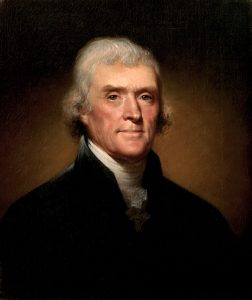
More recently, deists have been defined to be believers in what is known as the “Clockmaker Theory.” This is the belief that God created the universe and everything in it, but after doing so, removed himself from direct contact with its inhabitants and became a remote being.2 The World Union of Deists, the most prominent group of deists today, defines deism as a belief system that values reason over faith. They notice the laws and design that can be found throughout nature by science and attribute these laws to the “Designer of Nature.”3 From these varying definitions, it is evident that deism is a relatively broad term predominantly associated with using science, not faith, as the main source for one’s religious views. Thus, deists do not believe in the supernatural, an afterlife, or a personal god. Theism, on the other hand, stresses the belief in a present, personal god who chooses to intervene in the world when he sees fit. Although many scholars have simply labeled Thomas Jefferson a deist, his writings and actions, especially in the latter part of his life, suggest that Jefferson held a more complex, theistic belief in God.
One way that Jefferson’s views deviate from deist’s perspective are his beliefs regarding the supernatural. In a letter to John Adams on August 15, 1820, Jefferson details and justifies his belief in angels, spirits, and God. He writes:
“To talk of immaterial existences is to talk of nothings. To say that the human soul, angels, god, are immaterial, is to say they are nothings, or that there is no god, no angels, no soul. I cannot reason otherwise: but I believe I am supported in my creed of materialism by Locke, Tracy, & Stewart. At what age of the Christian church this heresy of immaterialism, this masked atheism crept in, I do not know. But a heresy it certainly is. Jesus taught nothing of it. He told us indeed that ‘God is a spirit,’ but he has not defined what a spirit is, nor said that it is not matter. And the antient [sic] fathers generally, if not universally, held it to be matter: light and thin indeed, an ethiriel gas; but still matter.”4
Arthur Scherr uses this excerpt as proof that Jefferson was a deist. He stresses that when Jefferson says, “talk of immaterial existences is to talk of nothings,” he is denouncing all supernatural things and therefore aligning himself with deist principles.5 Indeed, Jefferson stresses that immaterial things are nonsense and that everything must be material. However, he also strays away from deism since he affirms his belief in angels, the human soul, and God. While the belief in God does not disqualify him from being a true deist, the belief in angels and a human soul certainly does. One can also conclude that Jefferson values some aspects of theism as he clearly believes in at least some parts of the Bible; otherwise, he would have no basis for referencing angels. While it is undeniable that Jefferson is using deism to explain his beliefs, theism is also clearly present. This example highlights how scholars have oversimplified Jefferson’s beliefs by restricting them to deism, when he has undoubtedly been influenced by theism.
Jefferson’s use of the Bible also offers insight into how his religion was at least also theistic. While he believed that most of the New Testament had been altered by the early church and had strayed from God’s true intent, 6 Jefferson still advocated for a large portion of the Bible to be used, at the very least, as a great moral guide to life. Discussing this issue in a letter to Presbyterian minister Ezra Stiles Ely, Jefferson writes, “In that branch of religion which regards the moralities of life, and the duties of a social being, which teaches us to love our neighbors as ourselves, and to do good to all men, I am sure that you & I do not differ.”7 The teaching referenced here about loving one’s neighbor is a clear connection to Christian theology found in the Bible. This excerpt shows that Jefferson values the Bible to a certain extent; he just did not recognize the full work as the work of God. Furthermore, near the end of his life, he took the time to go through the entire Bible and remove the parts that he believed had been corrupted by the church and was no longer part of God’s true message. He describes this task in a letter, “I separate therefore the gold from the dross; restore to him the former, & leave the latter to the stupidity of some, and roguery of others of his disciples. Of this band of dupes and impostors, Paul was the great Coryphaeus, and first corrupter of the doctrines of Jesus.”8 Jefferson was clearly dedicated to the teachings of the Bible as part of his religion, otherwise he would not have taken the time to edit the Bible and create his own version. Historian Donald Viney argues that the Jefferson Bible offers a clear example of Jefferson’s deistic values. He asserts, “The Jefferson Bible stands as the clearest possible illustration of typical deistic ideas about revealed religion and Jesus of Nazareth.”9 However, altering the Bible in this way was unique to Jefferson and not indicative of a deist. So, while Jefferson rejecting miracles and the divinity of Christ can be seen as a deistic view, Jefferson’s work with the Bible really exemplifies his own very personal religious values. As a whole, Jefferson’s use of the Bible as an integral part of his moral and religious values once again highlights how he strays from deist principles as the sole guide for his religion and is influenced by theism.
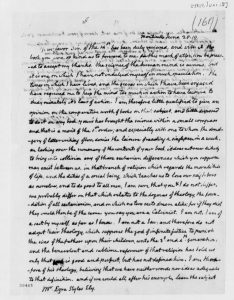
The part of Jefferson’s religion that is most unclear to scholars is his view on the afterlife. Both Viney and Scherr argue that Jefferson did not believe in the afterlife. Viney separates Jefferson’s views from his contemporaries Thomas Paine and Benjamin Franklin’s views in this regard: “Jefferson’s deism, unlike that of Franklin and Paine, did not include belief in life after death. Jefferson accepted the materialist idea of death as the complete annihilation of consciousness.”10 But Viney seems to define deism in a different way from the current, generally established definition. He claims that both Franklin and Paine are deists but still believed in the afterlife. This interpretation does not align with the Clockmaker Theory and suggests that Paine and Franklin believed in something that could not be proven by science. This deviation reinforces S.G. Hefelbower’s point mentioned earlier that certain scholars define the characteristics of deism differently. Additionally, Viney fails to substantiate the claim that Jefferson believed in complete annihilation of consciousness with any direct evidence. Jefferson’s writings, on the other hand, seem to suggest that he was at least open to the concept of an afterlife. In 1813, Jefferson suggests a clear belief in the afterlife when he writes to William Canby:
“An eloquent preacher of your religious society, Richard Motte, in a discourse of much emotion and pathos, is said to have exclaimed aloud to his congregation that he did not believe there was a Quaker, Presbyterian, Methodist or Baptist in heaven, having paused to give his audience time to stare and to wonder; he added, that, in heaven, God knew no distinctions, but considered all good men as his children and as brethren of the same family. I believe, with the Quaker preacher, that he who steadily observes those moral precepts in which all religions concur, will never be questioned, at the gates of heaven, as to the dogmas in which they all differ. That on entering there, all these are left behind us. . . . Of all the systems of morality, ancient or modern, which have come under my observation, none appear to me so pure as that of Jesus. He who follows this steadily need not, I think, be uneasy.”11
Not only does this explanation seem to confirm that Jefferson believes in the afterlife, but it also offers insight into his belief in a personal relationship with God, which would also stray from the opinions of a traditional deist. Furthermore, this is not the only time Jefferson expresses this opinion. One year later, in 1814, Jefferson writes to Miles King and closely mirrors the words that he used in his letter to William Canby:
“Nay, we have heard it said that there is not a quaker or a baptist, a presbyterian or an episcopalian, a catholic or a protestant in heaven: that, on entering that gate, we leave those badges of schism behind, and find ourselves united in those principles only in which god has united us all. Let us not be uneasy then about the different roads we may pursue, as believing them the shortest, to that our last abode; but, following the guidance of a good conscience, let us be happy in the hope that, by these different paths, we shall all meet in the end.”12
Over time, Jefferson continued to hold this opinion, as evident in a letter to John Adams in 1823: “I join you cordially, and await his time and will with more readiness than reluctance. May we meet there again, in Congress, with our antient [sic] Colleagues, and receive with them the seal of approbation ‘Well done, good and faithful servants.’”13 This writing, along with the others mentioned, seem to make Jefferson’s belief in the afterlife relatively clear. It should be noted that Viney and Scherr fail to reference these three excerpts while coming to their conclusions. Instead, they use Jefferson’s belief in materialism as a way to justify their claims. Scherr does, however, reference Jefferson’s friend Benjamin Rush who wrote in his autobiography that Jefferson did, in fact, have a strong belief in the afterlife. Scherr argues that Rush may have either misinterpreted Jefferson’s views or believes that Jefferson had lied to Rush in order to appease him. He also believes that this part of Rush’s autobiography may have been written by someone else and cannot be trusted.14 Regardless, Scherr’s perspective makes many assumptions that are not clearly confirmed in Jefferson’s writings. In contrast, there is definitely evidence within Jefferson’s writings to suggest he believed in an afterlife.
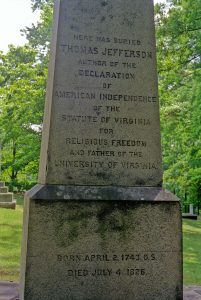
Jefferson’s stance on the role of government regarding religion is another one of his debated views. Jefferson is known for his statement in a letter to the Danbury Baptist Church that there is “a wall of separation between Church & State.”15 Recently, this line has been interpreted to mean that Jefferson wished for the government to have no association with religion, and that the two should operate as completely separate entities. This interpretation is then used as proof that Jefferson promoted a secular nation and deist values. However, as historian Daniel Roeber notes, “The wall of separation between church and state that was created by the First Amendment is alive and well, but for Jefferson, that wall was permeable.”16 Roeber suggests that while the barrier between church and state has been taken very strictly, Jefferson’s real aim for this statement was at a government’s establishment of religion, not the restriction of government involvement with anything related to religion. For example, two days after Jefferson wrote his famous line to the Danbury Baptists, he invited a preacher to speak inside the capitol building. This invitation would clearly violate a strict interpretation of separation between church and state. Furthermore, this type of invitation was not a one-time occurrence during his presidency. While Jefferson was president, government buildings were also used venues for church services hundreds of times. The most popular service took place in the House of Representatives, which Jefferson regularly attended.17 Thus, it is clear that Jefferson did not have a problem with the government being involved with religion in this manner. In addition, he believed it was important for the nation to establish a foundation of good morals and character, two things which the church could provide. What he disagreed with was the government establishing an official state religion. He believed that all denominations should be able to practice on equal footing, and that the state had no right to give one particular sect an advantage over the others.18 Jefferson was able to accomplish this goal in his home state of Virginia when the Statute of Virginia for Religious Freedom law was passed. This law was the first of its kind and allowed each individual to pursue the god they believed in, without interference from the state. Jefferson listed the Statute of Virginia for Religious Freedom as one of the achievements of which he was most proud, next to being the author of the Declaration of Independence and father of the University of Virginia. Per his request, these three accomplishments are engraved on his tombstone.19
In the end, the personal religion of Thomas Jefferson is just that, personal. As Jefferson says himself, “The subject of religion, a subject on which I have ever been most scrupulously reserved, I have considered it as a matter between every man and his maker, in which no other, & far less the public had a right to intermeddle.”20 While Jefferson’s writings and actions offer insight on his beliefs, the exact understanding of his values and beliefs will remain largely a mystery and left to assumption. What is evident, though, is that Jefferson’s religion was extremely unique and specific to him. He compiled philosophies and beliefs of all kinds in order to form what he believed was most accurate. Only the influence of theism could explain Jefferson’s pursuit of such a personal understanding of God and religion. To simply label Thomas Jefferson a deist is to ignore the intricacies of his thoughts and feelings on the topic. While he undoubtedly used deist principles to influence his thoughts, theism played a large role in developing his religion, too.
- S. G. Hefelbower, “Deism Historically Defined,” The American Journal of Theology 24, no. 2 (1920): 217. ↵
- Alan Brinkley, American History: Connecting with the Past Volume 1: to 1865, 15 edition (New York: McGraw-Hill Education, 2014), 184. ↵
- Bob Johnson, Deism: A Revolution in Religion – A Revolution in You (Clearwater, Florida: World Union of Deists, 2009), 11. ↵
- “Founders Online: From Thomas Jefferson to John Adams, 15 August 1820” (University of Virginia Press), accessed October 18, 2021, http://founders.archives.gov/documents/Jefferson/98-01-02-1458. ↵
- Arthur Scherr, “Thomas Jefferson Versus the Historians: Christianity, Atheistic Morality, and the Afterlife,” Church History 83, no. 1 (March 2014): 90-94, https://doi.org/10.1017/S0009640713001686. ↵
- “Founders Online: From Thomas Jefferson to John Adams, 11 April 1823” (University of Virginia Press), accessed October 18, 2021, http://founders.archives.gov/documents/Jefferson/98-01-02-3446. ↵
- “Founders Online: Thomas Jefferson to Ezra Stiles Ely, 25 June 1819” (University of Virginia Press), accessed October 20, 2021, http://founders.archives.gov/documents/Jefferson/03-14-02-0428. ↵
- Founders Online: Thomas Jefferson to William Short, 13 April 1820” (University of Virginia Press), accessed October 20, 2021, http://founders.archives.gov/documents/Jefferson/03-15-02-0505. ↵
- Donald Wayne Viney, “American Deism, Christianity, and the Age of Reason,” American Journal of Theology & Philosophy 31, no. 2 (2010): 97, https://doi.org/10.1353/ajt.0.0005. ↵
- Donald Wayne Viney, “American Deism, Christianity, and the Age of Reason,” American Journal of Theology & Philosophy 31, no. 2 (2010): 94, https://doi.org/10.1353/ajt.0.0005. ↵
- Thomas Jefferson, “Religion,” in The Quotable Jefferson, ed. JOHN P. KAMINSKI (Princeton University Press, 2006), 366, https://www.jstor.org/stable/j.ctv36zr3f.47. ↵
- Thomas Jefferson, “Religion,” in The Quotable Jefferson, ed. JOHN P. KAMINSKI (Princeton University Press, 2006), 354, https://www.jstor.org/stable/j.ctv36zr3f.47. ↵
- “Founders Online: From Thomas Jefferson to John Adams, 11 April 1823” (University of Virginia Press), accessed October 18, 2021, http://founders.archives.gov/documents/Jefferson/98-01-02-3446. ↵
- Arthur Scherr, “Thomas Jefferson Versus the Historians: Christianity, Atheistic Morality, and the Afterlife,” Church History 83, no. 1 (March 2014): 99-101, https://doi.org/10.1017/S0009640713001686. ↵
- “Jefferson’s Letter to the Danbury Baptists (June 1998) – Library of Congress Information Bulletin,” accessed October 21, 2021, https://www.loc.gov/loc/lcib/9806/danpre.html. ↵
- Daniel Roeber, “Critical Insights: Thomas Jefferson,” in Thomas Jefferson’s Church: Religious Services in the U.S. Capitol Building, ed. Robert C. Evans, Critical Insights (Salem Press, 2020), 16, https://salempress.com/Media/SalemPress/samples/ci_jefferson_pgs.pdf. ↵
- Daniel Roeber, “Critical Insights: Thomas Jefferson,” in Thomas Jefferson’s Church: Religious Services in the U.S. Capitol Building, ed. Robert C. Evans, Critical Insights (Salem Press, 2020), 3-6, https://salempress.com/Media/SalemPress/samples/ci_jefferson_pgs.pdf. ↵
- David Barton and Tim Barton, The American Story: The Beginnings, 2nd ed. (Texas: Wallbuilder Press, 2020). 251-255. ↵
- Arthur Scherr, “Thomas Jefferson Versus the Historians: Christianity, Atheistic Morality, and the Afterlife,” Church History 83, no. 1 (March 2014): 109, https://doi.org/10.1017/S0009640713001686. ↵
- Thomas Jefferson, “Religion,” in The Quotable Jefferson, ed. JOHN P. KAMINSKI (Princeton University Press, 2006), 353, https://www.jstor.org/stable/j.ctv36zr3f.47. ↵
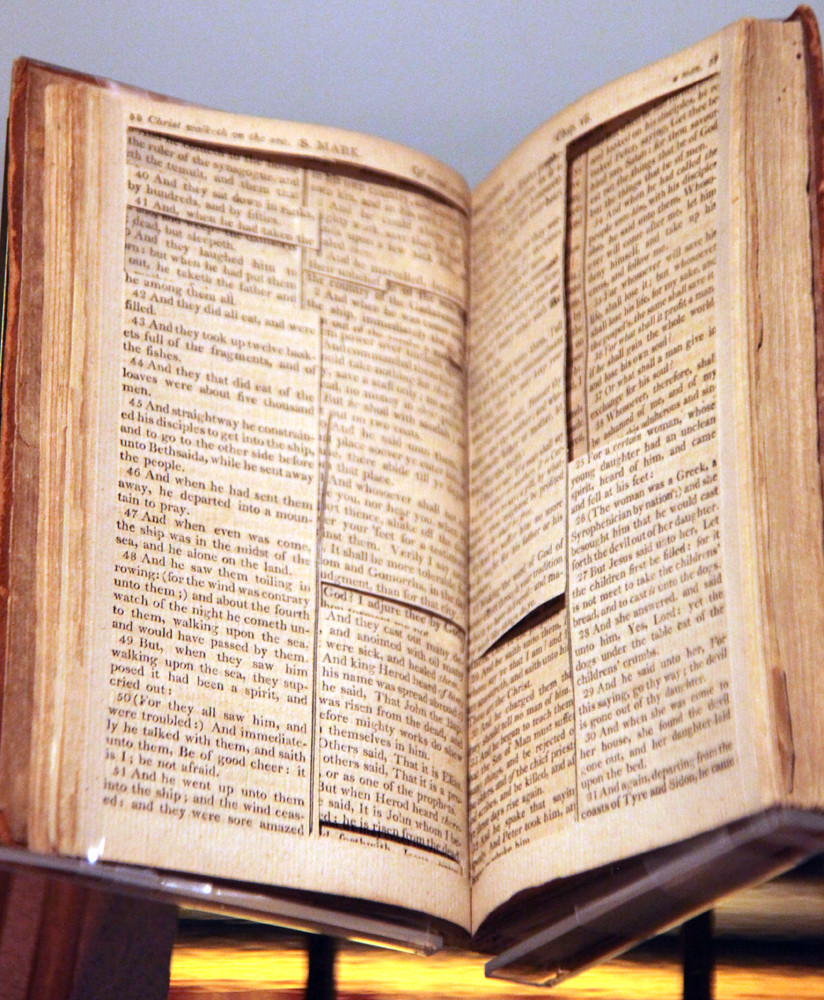

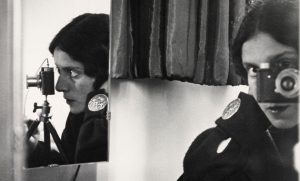

19 comments
Paul Garza
Hello, I really enjoyed reading this article. It brings attention to a historical factor that I believe is often forgotten. Jefferson, such a prominent figure in the United States history, and yet many forget or do not know about his religious beliefs. I think your article shows that the separation of church and state isn’t as separate as we think. You even point out how Jefferson might’ve seen this idea more as a base for government to establish a religion. This is a great article that really gets the reader thinking!
Aaron Fanning
This article is different but in a good way and it was informative. I’ve always known that Thomas Jefferson is an important figure of what he’s accomplished for the U.S. But never knew that he was a spiritual person. I found it quite refreshing learning about this topic and what Jefferson believed in. Overall this was a great article because this is the first article that covers a topic like this about a important figure.
Martha Nava
Great article, Tyler. I think you showcased your writing and research skills very well. I have never been particularly interested in History, but I still really enjoyed this article! I think it’s interesting how religion influenced plenty of his decisions. I also find it interesting how his religion is debated by many historians/scholars. I learned something new. Overall, very good job on your article.
Jaedean Leija
The article was very well written , I know that Jefferson takes a big part on today’s history but all I hear of him is politics but not many people know or care enough about how spiritual he really was. Hearing this side of him was a refresher and actually interesting to read about. I am so over reading or hearing about Jefferson in a politic way so reading this kept me entertained . Great article !
Hali Garcia
This is a very informative article. After reading this article, I realized how much I did not know about Jefferson and his beliefs so I learned quite a lot from this article. I like how the author mentioned how scholars emphasize different things when defining Deism and then gave an explanation of Deism. I liked that part because while I have heard of Deism, it was something that I struggled understanding. Great Job.
Hannah Young
A very interesting and informative article. I had no idea about this movement, the belief system of Jefferson, or the speculation that might have occurred of Theism and the influence it had over the president. I learned so much that I found I wanted to research more about and some facts that I wish I never knew for the harsh things that came with it. Very thought provoking.
Phylisha Liscano
Deism was never a term I thought I would see myself relating to. In fact, I was not aware of this movement until I read this eye-opening article by Tyler Pauli. The article was very informative about the personal religious belief system of Thomas Jefferson and the impact it had. While many were left to speculate whether Theism was of influence to our 3rd U.S president and his beliefs, his beliefs were uniquely understood by himself and that was and is all of importance.
Christopher Metta Bexar
An intriguing and informative article. It starts off by explaining for the reader what deism and theism are, then goes into its discussion of Jefferson. It is valuable in that it opens up the discussion in a thoughtful manner. Many of us don’t know about the private Jefferson and how it affected the public Jefferson.
Elliot Avigael
I appreciated this article. I think most dismiss the fact that Jefferson was a deeply spiritual man by deflecting to the fact that he believed in Deist principles. Deism is not about rejecting God, but rather, is debating God’s nature. It is not mutually exclusive with Judeo-Christian principles, something that Jefferson heavily believed in.
I think your conclusion did a good job at driving home that know one will know what Jefferson was thinking except Jefferson himself.